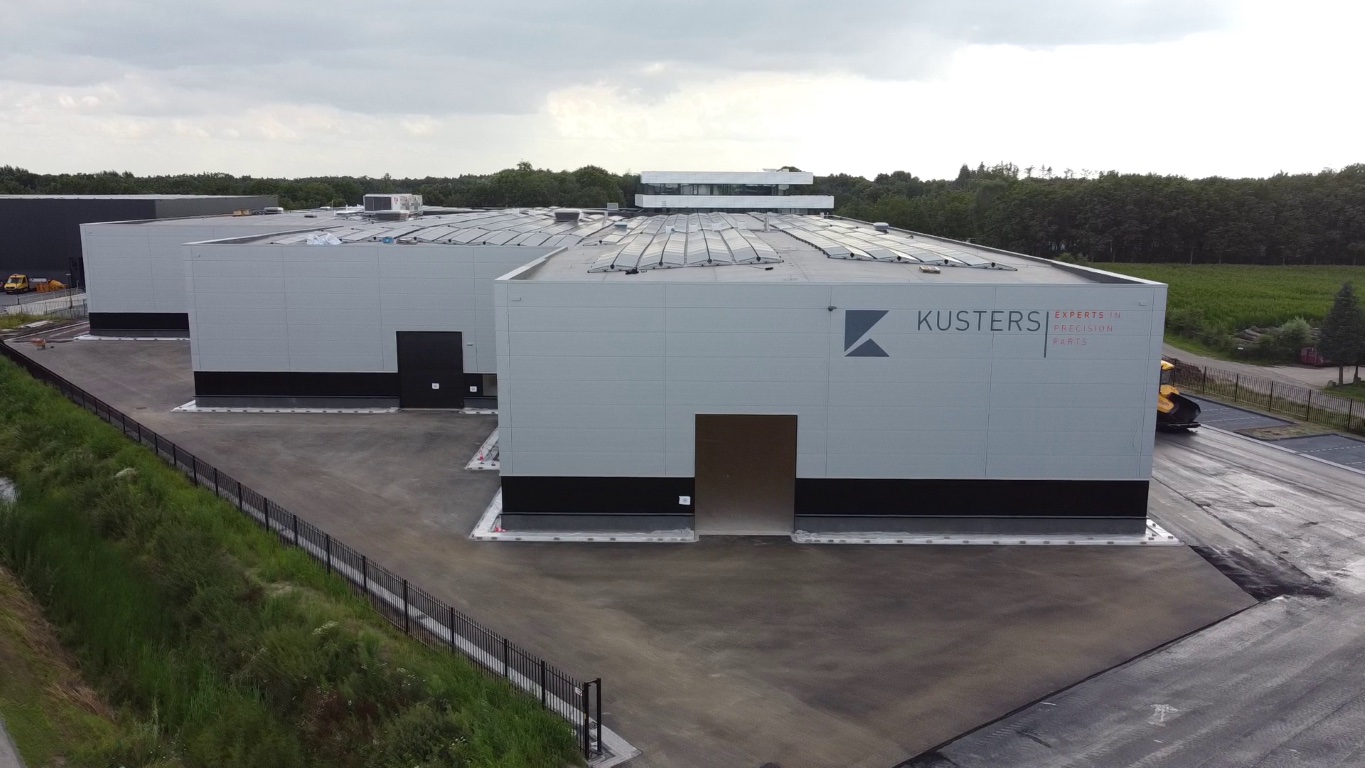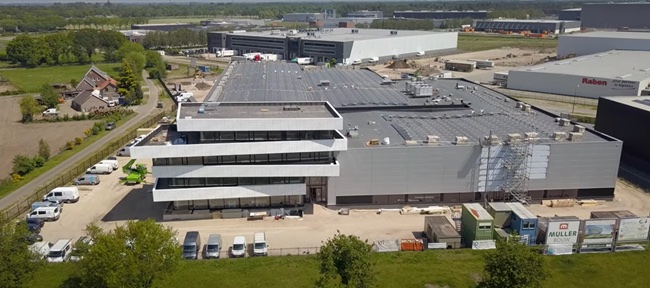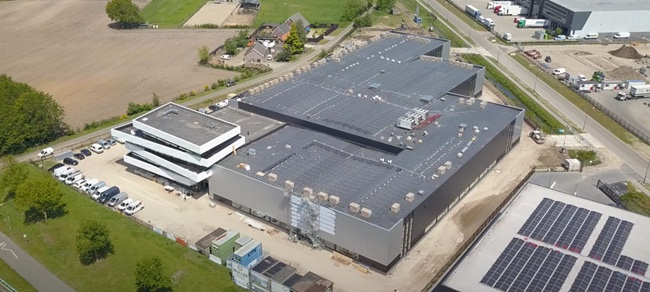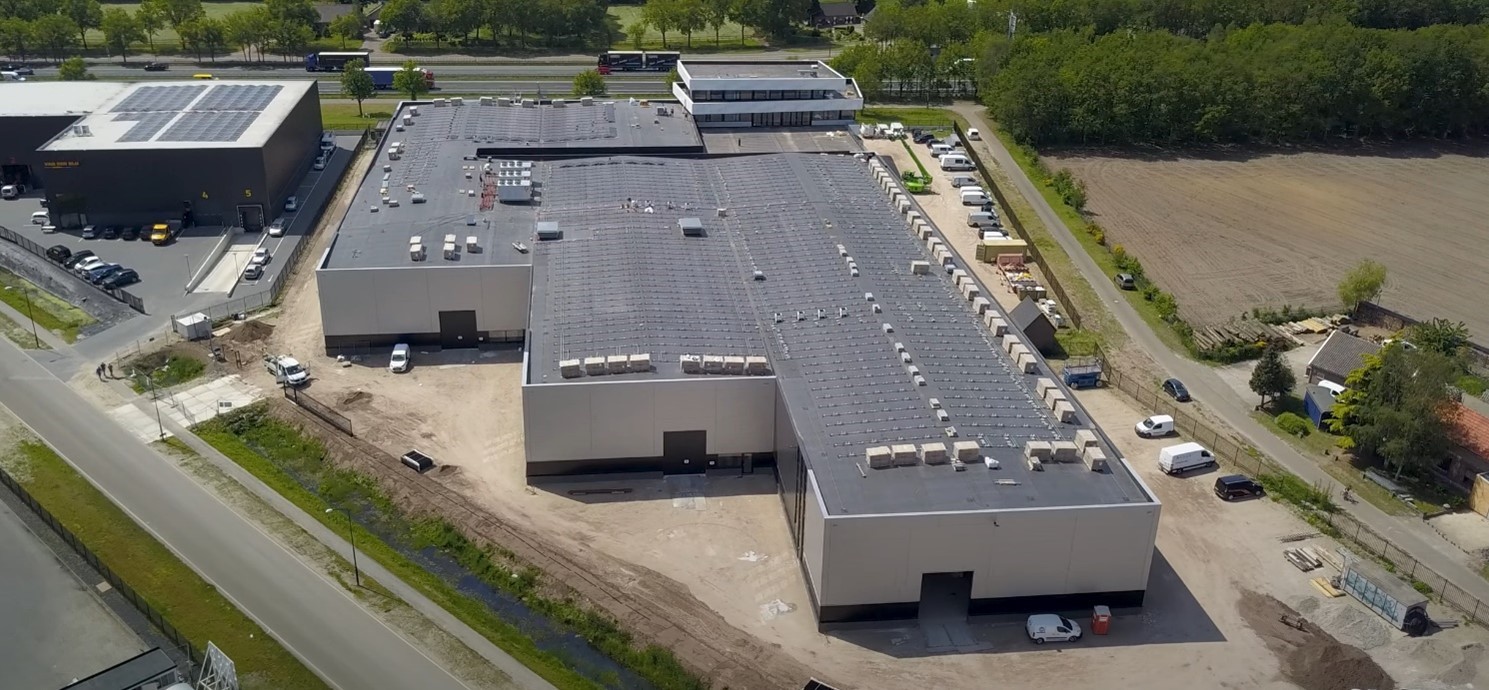
DensDeck® Prime Roof Boards specified for the solar panel flat roof on the Kusters Precision Parts factory
DensDeck® Prime Roof Boards used to meet performance requirements of the solar panel equipped flat roof on Kusters Precision Parts factory
DensDeck® Prime Roof Boards were specified to enhance fire resistance and help meet stringent insurance requirements for the 8,000 m2 flat roof installed with 6,500 m2 of roof mounted solar panels for a new factory in Oss, in the Netherlands. The facility was built for Kusters, a long-established, family run business, that manufactures precision parts for a variety of sectors including the semiconductor, automotive and aerospace industries.
Kusters had outgrown their existing facilities and their vision was to invest in a modern factory equipped with technologies that could generate renewable energy to help power its production processes whilst being built to operate with minimum disruptions for at least the next 60 years. In this way they could provide the best environment for their employees, grow the business and serve their growing customer base.
As well as serving as a robust, load-bearing platform to take the weight of the roof mounted solar PV panels, Kusters needed the roof build-up to provide long-term protection for its users, high-tech machinery and valuable precision parts being manufactured in the factory below. This included measures to mitigate any fire risk posed by the installation of solar panels and demonstrate to potential building insurance providers that a best practice approach had been taken to minimise the impact of an outbreak of fire on the factory.
What were the implications for Kusters if they couldn’t minimise the fire risks of the solar panel roof?
Minimising the fire risks to a building where a solar panel flat roof has been specified is a key concern for insurance companies. There are already cases in the Netherlands, where solar panel roofs were initially covered by insurance, but a review of the ongoing fire risks of the roof to the building it protects had resulted in the complete withdrawal of insurance cover for the building.
If Kusters were to experience such an insurance cover refusal on their new factory, the only way to continue to use the building would be to unplug the solar panels. This would result in the immediate loss of the renewable energy and the redundancy of the capital investment made in the solar panel system. Any government subsidies received for renewable energy generation would also cease to be paid and some grants may need to be reversed if the solar panel installation was removed.
In order for Kusters to avoid considerable insurance premium losses or the possibility of the insurance being withdrawn, a robust solar panel roof specification needed to be found that would address the fire risk concerns of the insurers.
How was a roof specification created to address the fire risk concerns of the insurers?
Kusters sought the advice of flat roofing experts to help propose a robust specification that would satisfy the concerns of the insurers and provide the long-term protection they desired for their new factory.
The starting point for the roof was its lightweight concrete deck. It has a structure that is not of uniform thickness and limits the suitability of mechanically fixed roofing systems. However, the concrete itself is non-combustible so does not contribute to the fire load and meets the regulatory criteria concerning spread fire from within the building without the need to specify sprinkler systems.
This was not the case when looking at fire spread from outside the building, however, and attention switched to looking for ways to provide increased fire resistance to the roof build-up and to do so using a fully adhered system.
At this point the suggestion was made by Eddy Harthoorn, Business Development Manager at Elevate, to use fire resistant roof boards underneath the waterproofing membrane. However, the Netherlands market is not overly familiar with the use of this product. The challenge became how to prove to the satisfaction of the insurers, the suitability and performance of not just fire resistant roof boards, but also that of all the other components in any proposed roofing build-up.
Why were FM Approved products key to the success of the final specification for the solar panel roof?
The challenge was met when Eddy suggested looking for roofing components that have FM Approval. FM Approvals rigorously test products and systems against a range of criteria including fire performance. They are extensively used in the USA and are well respected by insurance companies across Europe, including the Netherlands, as they are seen to offer solutions that go beyond standard regulatory requirements.
Due to their performance when tested to a range of internationally recognised fire classification standards, DensDeck® Prime Roof Boards are deemed as fire resistant1. They are made from a non-combustible gypsum core and fibreglass mats. The fibreglass mat facers form the first line of defence against a fire and the gypsum core contains crystalised water incorporated into its structure that is vaporised by heat, calcining the gypsum and creating a natural barrier to increase its fire resistant properties.
DensDeck® Prime Roof Boards have been included in hundreds of thousands of FM Approved flat roof assemblies. They were specified for the Kusters project not just to increase fire resistance, but also for their extra load bearing capacity and ability to increase the durability of the roof. DensDeck® Prime Roof Boards have excellent compressive strength and rigidity and can help to spread the load imposed by the solar panels. This reduces compression on the insulation layer and offers a stable base underneath the PV panels, increasing the robustness and longevity of the solar panel roof of the new factory.
The final specification for the roof saw a RubberGard EPDM waterproofing membrane being fully adhered to the DensDeck® Prime Roof Boards that sat over a layer of RESISTA AK PIR insulation. This was adhered to a torched-on bituminous vapour barrier over the concrete deck. All products used were FM Approved right down to the adhesives used. Whilst the whole roof assembly normally needs to be FM Approved, in this instance the use of FM Approved products was deemed as acceptable by Kusters’ insurance company. The insurance cover for the roof was offered for 10 years, instead of the usual 5, and at a reduced premium due to the low risk to the insurers offered by the robust solar panel roof design incorporating FM Approved products.
This view taken by the insurance company that the roof assembly represented a low risk was important to the client. It gave Kusters the confidence that the insurance company would not require the solar panels to be unplugged after future insurance inspections. The proposed final specification added just one and a half years to the ROI payback over the 60-year life of the roof installation, and for Kusters that represented good value for the reassurance it offered.
Eddy summed this up nicely when he was asked about the contribution that roof boards had made to the project: ‘DensDeck® Roof Boards helped to increase the durability and fire resistance of the roof build-up. The completed roof solutions gave the client the peace of mind that their asset is protected, and the roof will perform well over a long period of time.’
If you would like to find out how using DensDeck® Prime Roof Board could help reduce the insurance risks on your next solar panel flat roof project please contact us today for more information and advice.
[1] DensDeck® Roof Boards have an A1 fire classification in accordance with BS EN 13501-1 and are classified as non-combustible as described and tested in accordance with ASTM E136 or CAN/ULC S114
DensDeck® Roof Boards helped to increase the durability and fire resistance of the roof build-up. The completed roof solutions gave the client the peace of mind that their asset is protected, and the roof will perform well over a long period of time.


